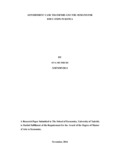| dc.description.abstract | This study sought to investigate the relationship between cash transfer remittances
from government to poor households and school enrolment in Kenya. While most of
the studies carried out in Sub- Saharan Africa are based on an experimental evaluation
design, this study utilised cross sectional data from the Government of Kenya’s
2005/2006 Integrated Household Budget Survey and a probit model as the basis of its
econometric analysis. The probit regression marginal effects results from the study
indicated that cash transfers positively and significantly influenced school enrolment.
Similarly, size of the household, urban area residency, age of the household head and
being married, positively influenced school enrolment. On the contrary, households
headed by a man and the literacy levels of the male head in the household negatively
influenced school enrolment. The main policy implication of this study therefore, is
that cash transfers should be enhanced and should be channelled through women as
opposed to men because they seem to have more priority for education in their
expenditure plans in comparison to men. | en_US |



